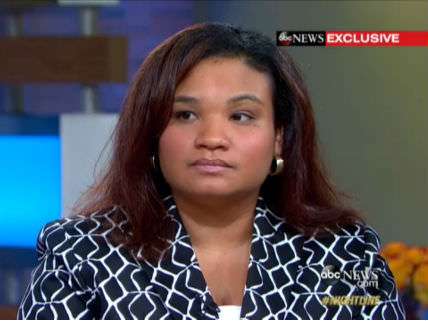Zimmerman Juror Put Her Head Above Her Heart

Unlike Juror B37, who spoke to CNN's Anderson Cooper shortly after George Zimmerman's acquittal, Juror B29, who spoke to ABC's Robin Roberts this week, did not sit in shadows. You therefore can plainly see that, contrary to press reports (including mine!) saying the jury did not include any blacks, the women who found Zimmerman not guilty included at least one whose complexion is darker than President Obama's. Juror B29, whose first name is Maddy (she did not want her last name publicized), identifies herself as a "black Hispanic," a label that also could accurately be applied, based on American racial conventions, to Zimmerman himself, since he had an Afro-Peruvian great grandfather. These details complicate the black-and-white narrative favored by critics of the verdict, including Obama and Attorney General Eric Holder.
Maddy, who initially voted to convict Zimmerman of second-degree murder, apparently was much less sympathetic to him than Juror B37. She nevertheless agreed that race played no role in the deliberations, saying, "I never looked at color." She also agreed that the jury had no choice under the law but to acquit Zimmerman, even though she believes he is morally responsible for Trayvon Martin's death. "I stand by the decision because of the law," she said. "If I [made] the decision because of my heart, he would have been guilty."
Contrary to observers who keep insisting that the right to stand your ground could have played a role in Zimmerman's acquittal, even though it played no role in his defense or prosecution, Maddy said nothing about the duty to retreat. Instead she focused on the elements required to prove second-degree murder or manslaughter. Some of what she said was not quite right. "As the law was read to me," she said, "if you have no proof that he killed him intentionally, you can't say he's guilty." But Zimmerman has never denied that he deliberately shot Martin in the chest; the question was whether the shooting was justified by self-defense. Regarding the manslaughter charge, Maddy said "we had to prove that when he left home, he said, 'I'm going to go kill Trayvon Martin.'" That sort of intent is not required to prove manslaughter, which is an unjustified killing without the addtional elements necessary for murder. What Maddy describes sounds like first-degree murder. In any case, it is hard to imagine how Zimmerman could have planned to kill someone he had yet to meet.
Although Maddy may simply have misspoken during the interview, these statements make me wonder if she misunderstood the jury instructions. Either way, the dilemma she describes was one that several jurors faced: They wanted to find Zimmerman guilty of something, because they believed (correctly) that Martin would still be alive if Zimmerman had not deemed him suspicious and followed him. But they also concluded (correctly) that the prosecution had not presented enough evidence to show beyond a reasonable doubt that Zimmerman was not acting in self-defense at the moment he fired his gun. "A lot of us had wanted to find something bad, something we could connect to the law, because for myself, he's guilty," Maddy said. "I would like to apologize [to Martin's parents], because I feel like I let them down. We just couldn't prove anything….I know I went the right way, because by the law and the way it was followed was the way I went. But if I had used my heart, I probably would have [created] a hung jury."

Show Comments (50)